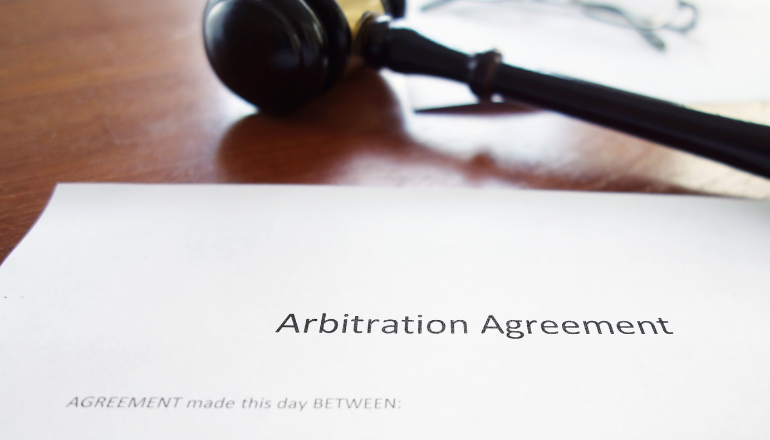
Introduction
It is trite that a company is a separate legal entity, and is distinct from its members.[1] As Lord Sumption observed in Prest v Petrodel Resources Ltd.[2], “The separate personality and property of a company is sometimes described as a fiction, and in a sense it is. But the fiction is the whole foundation of English company and insolvency law.” Equally sacrosanct is the principle that arbitration proceeds on the basis of an agreement between parties. After all, “like consummated romance, arbitration rests on consent”.[3] However, practical considerations have led to the marginal dilution of these otherwise fundamental principles.
There are instances where a company and its members are not treated as separate legal entities (i.e. where the corporate ‘veil’ is pierced). Similarly, there are cases where arbitral proceedings enjoin non-signatories.[4] A unique amalgam of these exceptions is found in cases where an arbitral award is sought to be executed against an entity that was never a party to the arbitral proceedings. For example, in Cheran Properties Limited v. Kasturi and Sons Limited and Ors.[5] (“Cheran Properties”), applying the ‘group of companies’ doctrine expounded in Chloro Controls,[6] and analysing Section 35 of the Arbitration and Conciliation Act, 1996 (“Act”) to ascertain who “persons claiming under them” would be for the purpose of binding such persons to the arbitral award, the Supreme Court permitted enforcement of an arbitral award against a third party/non-signatory. In this post, however, our focus is on whether Indian courts have pierced the corporate veil to execute an arbitral award against a third party to the arbitral proceedings when such third party’s unique relationship with the award debtor has been exploited to fraudulently circumvent or frustrate execution of the arbitral award.
Indian Judiciary’s Approach
In a recent judgment passed on February 7, 2020, in the case of Mitsui OSK Lines Ltd. (Japan) v Orient Ship Agency Pvt. Ltd. & Ors.[7] (“Mitsui”), the Bombay High Court has essentially held that the corporate veil cannot be lifted to implead individuals who were neither party to the arbitration agreement nor the Foreign Award. In this case, for execution of a Foreign Award as a decree of the court, a Chamber Summons was filed seeking impleadment of associate companies and common directors of the award debtor as additional respondents. These proposed additional respondents allegedly siphoned-off monies from the award debtor with a view to frustrate execution of the Foreign Award and were sought to be made personally liable for satisfaction of the decree in execution proceedings. In arriving at his conclusion, the Ld. Single Judge of the Bombay High Court inter alia observed as follows:
- lifting the corporate veil in this case would amount to proceeding behind and/or beyond the decree;
- the application is a desperate attempt by the award holder to enjoy the fruits of the Foreign Award passed in its favour by going against entities which were neither parties to the arbitration agreement, nor to the Foreign Award;
- the proposed additional respondents against whom the Foreign Award is sought to be executed ought to have been afforded an opportunity under Section 48 of the Act, to show cause as to why the Foreign Award should not be enforced against it;
- the question of whether the corporate veil can be lifted is an issue of trial and cannot be decided in a summary manner in a chamber summons; it would have to be decided in a substantial suit; and
- in any event, no case on facts is made out for lifting of the corporate veil.
The Bombay High Court analysed and distinguished several High Court judgments which held that the corporate veil may be lifted in the right circumstances even in execution proceedings. The following may be relevant to note in this regard:
- A division bench of the Bombay High Court, in a Letters Patent Appeal from an order passed under Section 46 of the Code of Civil Procedure, 1908 (“CPC”) in the case of Bhatia Industries & Infrastructure Ltd. v. Asian Natural Resources (India) Ltd. [8] (“Bhatia Industries & Infrastructure Ltd.”), held that the corporate veil could be pierced to enforce an international arbitral award against Bhatia Industries and Infrastructure Limited. In the said case, the award creditor alleged that certain property was being fraudulently siphoned-off from the award debtor company to Bhatia Industries and Infrastructure Limited. The court allowed attachment of Bhatia Industries and Infrastructure Limited’s property and held that it was an alter-ego of the award debtor which the owners of the corporate group were using as a “ploy” to avoid the execution of the international arbitral award. The Court in Mitsui distinguished this decision on facts, observing inter alia that: (a) there was a finding that the attached property, in fact, belonged to the award debtor and not to the third party; (b) when the third party sought to vacate the attachment, the court came to the conclusion that the third party and the judgment debtor were one and the same and therefore, the attachment, in effect, was of the properties of the judgment debtor; and (c) a Special Leave Petition against this decision was dismissed by the Supreme Court, while the question of law was left open.
- The Court distinguished the judgments of Formosa Plastic Corporation Ltd. v Ashok Chauhan & Ors., [9] and M/s. Sai Sounds Private Ltd. v M/s. Kiran Contractors Private Ltd. [10] (which were in the context of judicial decrees) on facts. According to the Court, in the Formosa case, the Delhi High Court saw no reasons to interfere with a mareva injunction restraining third parties to a decree from alienating property of the judgment debtor (though created in the name of such third parties). The Court did not decide whether the said third parties were personally liable for satisfaction of the decree. In the Sai Sounds case, the third-party individual (being the Managing Director of the judgment debtor) personally undertook to satisfy the decree and it was in those circumstances that he was held personally liable for satisfaction of the decree.
- The Bombay High Court in Mitsui also considered if lifting of the corporate veil could at all be examined by the executing court under Section 47 of the Code of Civil Procedure, 1908 (“CPC”).[11] It may be pertinent to note that the Supreme Court in the case of Punjab State Civil Supplies Corporation Ltd. and Ors. vs. Atwal Rice and General Mills[12] (“Punjab State Civil Supplies”) analysed the nature of certain objections raised in execution proceedings under Section 47 of the CPC and held they ought to have been raised at the stage of challenging the award under Section 34 of the Act. The court held that it certainly could not allow such objections to be raised during execution proceedings.
- In Mitsui, the Court concluded that the issue of impleadment of proposed additional respondents does not fall within the ambit of Section 47 of the CPC (which is a complete code) since they were neither legal representatives nor representatives of the judgment debtor. The Ld. Single Judge, however, did not consider the Delhi High Court judgment in the case of Balmer Lawrie & Co. Ltd. v Saraswathi Chemicals Proprietors Saraswathi Leather Chemicals (P) Ltd.[13] (“Balmer Lawrie”) where an application was filed in an execution petition seeking impleadment of non-signatory third parties to the arbitral award/agreement to make them personally liable for satisfaction of the award/decree, on the ground that the said third parties had siphoned-off the assets of the judgment debtor company. In the said case, the Delhi High Court held that the court is not power-less to extend its reach to third parties in cases where it is found that the assets of the judgment debtor have been secreted, siphoned-off, or by a fraudulent device ostensibly placed outside the control of the judgment debtor i.e. in cases where a corporate façade is used to perpetuate fraud. However, in the particular facts and circumstances of the Balmer Lawrie case, the court held that no cause was shown for lifting of the corporate veil.
Conclusion
On a combined reading of the judgments rendered by the Apex Court in the cases of Chloro Controls and Cheran Properties, it emerges that the Courts do have the power in appropriate cases to enjoin non-signatories in the enforcement of an arbitral award. However, in view of the judgments discussed in this post and those passed by various other High Courts, it remains to be seen how the Supreme Court will deal with a situation where the ‘group of companies’ doctrine does not apply, but where a fraudulent device is created using a non-signatory to the arbitration agreement so as to frustrate execution of the arbitral award/decree.
[1] Saloman v A Saloman & Co. Ltd., [1896] UKHL 1.
[2] [2013] UKSC 34.
[3] William W. Park, “Non-Signatories and International Contracts: An Arbitrator’s Dilemma”, in Multiple Party Actions in International Arbitration 1 (2009).
[4] Section 8(1) of the Arbitration and Conciliation Act, 1996 (as amended by the 2015 amendment) which provides as follows: “A judicial authority, before which an action is brought in a matter which is the subject of an arbitration agreement shall, if a party to the arbitration agreement or any person claiming through or under him, so applies not later than the date of submitting his first statement on the substance of the dispute, then, notwithstanding any judgment, decree or order of the Supreme Court or any Court, refer the parties to arbitration unless it finds that prima facie no valid arbitration agreement exists”; Chloro Controls India Pvt. Ltd. v. Severn Trent Water Purification Inc. & Ors., (2013) 1 SCC 641 at para 43 held as follows: “A non-signatory or third party could be subjected to arbitration without their prior consent, but this would only be in exceptional cases. The court will examine these exceptions from the touchstone of direct relationship to the party signatory to the arbitration agreement, direct commonality of the subject-matter, and the agreement between the parties being a composite transaction.” (followed in Ameet Lalchand Shah and Ors. v. Rishabh Enterprises and Anr., 2018 SCC Online SC 487).
[5] 2018 SCC Online SC 431.
[6] (2013) 1 SCC 641.
[7] Mitsui OSK Lines Ltd. (Japan) v Orient Ship Agency Pvt. Ltd. and Ors., 2020 SCC OnLine Bom 217.
[8] [2017] 201 CompCas 46 (Bom).
[9] 76 (1998) DLT 817.
[10] [2016] 199 CompCas 636 (P&H).
[11] Section 47(1) of the Code of Civil Procedure provides as follows: “All questions arising between the parties to the suit in which the decree was passed, or their representatives, and relating to the execution, discharge or satisfaction of the decree, shall be determined by the Court executing the decree and not by a separate suit”.
[12] AIR 2017 SC 3756.
[13] (2017) DLT 217.



